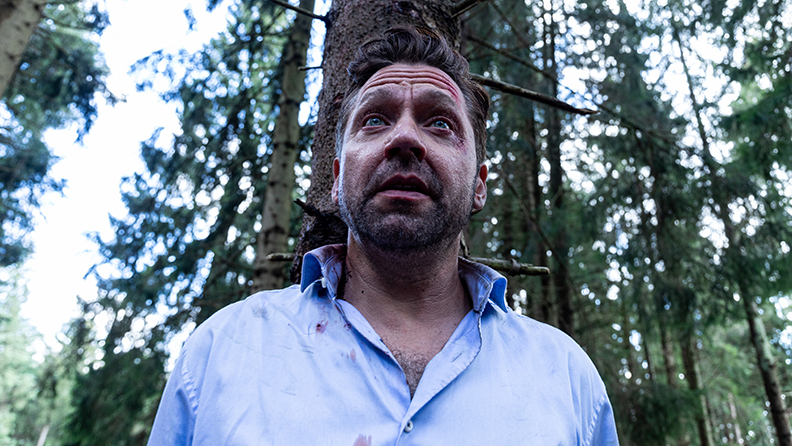
Survival Meets Moral Reckoning in Nature
MOVIE REVIEW
Bark
–
Genre: Thriller
Year Released: 2023, Dark Sky Films 2025
Runtime: 1h 30m
Director(s): Marc Schölermann
Writer(s): Steve Fauquier
Cast: Michael Weston, AJ Buckley, Ricky Watson, Lennon Sickels, Joana Vinogradoff, Crazy Horse
Where to Watch: available via VOD on June 13, 2025
RAVING REVIEW: When a movie builds this much tension using little more than two actors, a tree, and a forest, it's doing something right, at least most of the time. Something is compelling about a minimal setup that borders on being experimental. Yet, it plays out like a psychological chess match, constantly forcing the audience to re-evaluate what they think they know. From the first frame, it’s not about what’s happening—it’s about why.
The story centers around Nolan Bentley, who wakes to find himself bound to a tree in the middle of nowhere. There is no context, no visible injuries aside from the rope burns and a bruised ego. The forest setting quickly becomes a third character—quiet, ever-watching, and deeply isolating. Then, a stranger appears just as the situation starts to feel hopeless. He’s chatty, unbothered, and notably uninterested in helping. That disinterest becomes the hook, shifting the story from survival drama to psychological standoff.
Michael Weston fully commits to the role of Nolan, capturing a range of emotional unraveling without resorting to overacting. From his physical struggle with dehydration to moments of internal reckoning, he grounds the experience. Opposite him, A.J. Buckley’s calm, collected demeanor is unnerving in all the right ways. His measured silence carries more tension than any explosive dialogue. He isn’t framed as a villain, but he’s not a savior either—and that ambiguity is where much of the intrigue lies.
The cinematography plays with this setup. Tight close-ups on blistered wrists and glances toward unreachable salvation make the space feel suffocating, even though they’re surrounded by open nature. It’s a clever use of framing, turning the wide outdoors into a prison. You’re not just watching Nolan’s struggle; you’re meant to feel it.
Rather than relying on backstory, the film allows scattered fragments of memory and hallucination to drip-feed context. The audience is left piecing together what Nolan did to land in this situation, with clues teased through disjointed images and vague conversations. These non-linear inserts don’t always help to clarify the problem, but they provoke curiosity. It’s a risky choice that works more often than not.
That said, the dialogue sometimes stumbles. The exchanges between Nolan and the man occasionally feel too staged or philosophical, like rehearsed parables instead of genuine conversation. There are moments where the screenplay doubles back on itself, revisiting themes it has already addressed, and that repetition threatens to dull the tension.
The final third delivers the shift the entire film builds toward. It’s not a shocking twist but rather a moral unmasking that changes how we interpret everything leading up to it. Some might see it as a narrative gut punch, while others may question how direct it becomes. For me, it walked a fine line. The reveal doesn't reinvent the genre but reframes the situation just enough to keep the audience engaged through the end credits.
Where the movie lands best is in its refusal to answer every question. It trusts viewers to sit in discomfort, to judge without all the facts, and to realize that sometimes silence can carry more weight than an explanation. The stranger never explicitly says why he won’t help, but the clues are there if you’re paying attention. That moral ambiguity turns the film into more of an ethical dilemma than a conventional thriller.
If there’s a missed opportunity, it’s in the film’s early reliance on prolonged standoffs. The repetitive nature of some interactions could’ve used trimming. Even within its brief runtime, some stretches risk losing engagement by circling the same question too long without adding new layers. A few more variations in the pacing or tone might’ve helped keep the experience sharper from start to finish.
By the end, you’re not left with closure. You’re left with questions about justice, consequences, and the line between observer and participant. That kind of ending lingers, even if the road there was uneven. This isn’t the kind of movie built to dazzle. It’s built to unnerve. It wants you to think, squirm, and wonder if mercy is owed or earned. That’s a tall order for a film this confined in scope. But it makes the most of what it has, especially when it leans into discomfort rather than trying to explain it away.
Please visit https://linktr.ee/overlyhonestr for more reviews.
You can follow me on Letterboxd, Instagram, Twitter, and YouTube. My social media accounts can also be found on most platforms by searching for 'Overly Honest Reviews'.
I’m always happy to hear from my readers; please don't hesitate to say hello or send me any questions about movies.
[photo courtesy of DARK SKY FILMS]
DISCLAIMER:
At Overly Honest Movie Reviews, we value honesty and transparency. Occasionally, we receive complimentary items for review, including DVDs, Blu-rays, CDs, Vinyl Records, Books, and more. We assure you that these arrangements do not influence our reviews, as we are committed to providing unbiased and sincere evaluations. We aim to help you make informed entertainment choices regardless of our relationship with distributors or producers.
Amazon Affiliate Links:
Additionally, this site contains Amazon affiliate links. If you purchase through these links, we may receive a commission. This affiliate arrangement does not affect our commitment to honest reviews and helps support our site. We appreciate your trust and support in navigating these links.



Average Rating